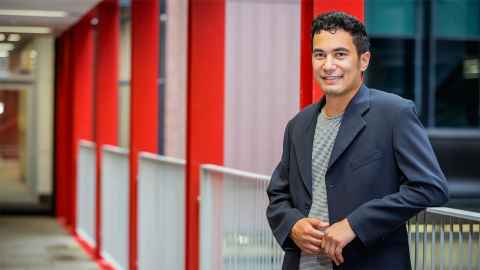Take 10 with... Matt Edwards
Dr Matt Edwards, Lecturer in the Department of Statistics, gives us 10 minutes of his time to discuss his research into the mysteries of the Universe.

1. Describe your research topic to us in 10 words or less.
Statistics in space! Uncovering the mysteries of the Universe.
2. Now describe it in everyday terms!
Gravitational wave astronomy is a new way to observe the universe, using gravity rather than light. I use statistics and machine learning to find out interesting things about these messengers from space, such as how massive a black hole is and how fast it is spinning before it collides into another black hole, or understanding the underlying mechanism that drives a massive star to explode. I also develop methods to remove loud noise from these quiet signals.
3. Describe some of your day-to-day research activities
I spend most of my time reading scientific papers, formalising statistical models and algorithms, writing software, and meeting with astrophysicists and fellow statisticians to discuss various projects we are working on together.
4. What do you enjoy most about your research?
The sheer variety. Each day is different from the last, and novel problems pop up all the time. It certainly keeps me interested in what I’m doing. I also like how flexible research can be and how you can always find new avenues to explore.
5. Tell us something that has surprised or amused you in the course of your research?
Networking at a conference can lead to fruitful collaborations and often it’s the informal discussions that matter most. For example, I’ve just submitted a paper that was dreamt up over a cheeky pint!
6. How have you approached any challenges you’ve faced in your research?
I often get my best thoughts when I run. If I get stuck on a problem, I think about it while running. Having a change in scene and getting out into nature can really help me overcome some mental blocks that hinder my progress. As they say, 'healthy body, healthy mind'.
7. What questions have emerged as a result?
Why do some astrophysical parameters seem to have very little effect on supernova signals? We thought it was not possible to extract the nuclear equation of state, which governs how matter behaves at high densities, because it seems to have very little influence over what the signal looks like. It turns out machines are better equipped to see nonlinear patterns in images than us mere mortals, and state-of-the-art convolutional neural networks can unexpectedly classify the equation of state with great accuracy.
8. What kind of impact do you hope your research will have?
I want my statistical models to be used to ensure we get the best out of the data; to ensure astrophysical parameter estimates are accurate, precise, and unbiased. I hope we can uncover new and interesting things that we didn’t know about the Universe.
9. When you collaborate across the faculty or University, or outside the University, who do you work with and how does it benefit your research?
I am currently a member of the LISA Consortium, which is an international team of scientists working on data analysis, instrument development, and science for the future space-based gravitational wave detector, Laser Interferometer Space Antenna (LISA).
As a statistician, it’s very important to collaborate with subject matter experts, which is why I work so closely with astrophysicists, most of whom are based in Scotland, France, Germany, and the US. They provide the context of the astrophysical problem that needs solving and I provide the statistical expertise they need to solve it.
My primary statistical collaborator is Professor Renate Meyer, who is based here at the University of Auckland's Department of Statistics. I also work with other statisticians here in Auckland, such as Dr Kate Lee and Dr Patricio Maturana-Russel, on various gravitational wave data analysis projects. Auckland has a great breadth and depth of statistical skills.
10. What one piece of advice would you give your younger, less experienced research self?
Be kind to yourself. If you don’t solve the problem today, there’s always tomorrow.